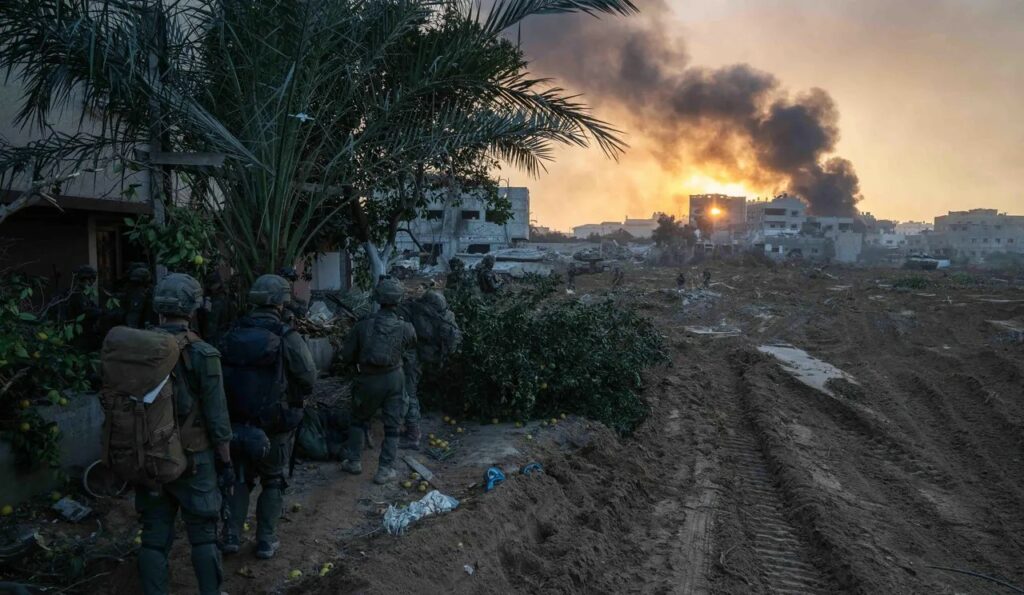The Israeli army released on New Year's Day figures showing that close to 18 % of the soldiers killed in the war since the ground offensive in the Gaza Strip started were killed by its own fire or because of accidents.
Among the 171 soldiers killed so far, 19 were killed by friendly fire because of mistaken identification and 11 in accidents, according to a press release.
The war started on 7 October with Hamas surprise terrorist attack on Israel. After almost three months of urban fighting in the crowded Gaza Strip, and calls for a cease-fire or humanitarian pauses, there is still no end in sight. Despite its heavy losses and the unprecedented humanitarian disaster in the Gaza Strip, Hamas refuses to surrender and continues to fight from its underground tunnel network.
Israel says that the war will continue for months until Hamas has been dismantled. The government claims that the military pressure will lead to the release of the remaining hostages taken by Hamas on 7 October. In a previous hostage-prisoners exchange, 121 hostages were released but Hamas and other groups in Gaza are still holding 119 hostages.
Some hostages have already been killed by Hamas, Israel says. There is a risk that the remaining hostages will not survive much longer the conditions and violence in captivity. They might also be used as Hamas’ ‘life insurance’ when the Israeli forces are closing in on its military leadership which is assumed to be hiding in the south of the Gaza Strip.
On the Israeli side, the most tragic incident occurred on 15 December when three hostages who had managed to escape in the north of Gaza were shot by mistake by Israeli soldiers. The army released the results of its own investigation last Thursday. While taking responsibility for the incident, the army acquitted the soldiers and their commanding officers, and none of them was held accountable.
The hostages, three young men, did everything in their power to draw the attention of the troops fighting in the area that there were hostages there that needed to be rescued. They left messages and signs on 10 December that were misunderstood by the troops, who thought that they were written by Hamas to trap them, and never transmitted to a Command Centre for the Return of the Hostages.
The hostages also tried to avoid being killed by “friendly fire”. After hiding in a house that had been bombed, they ventured out om 15 December. They were shirtless to show that they were not hiding any explosives and had raised their hands in the air. One of them was also waving a makeshift white flag.
When approaching the troops, a soldier in a building 40 meters away opened fired against them within half a minute after having noticed them, claiming that he thought they posed a threat. Two of them were killed immediately and the third one was injured and ran away to a building. The troops consisted of conscripted solders who had just finished their platoon training before the war.
The battalion commander of the troops heard him shouting “Help” and “They are shooting at me”. The commander ordered the soldiers to halt the fire and shouted to him “Come my way”. When he did that after 15 minutes, he was shot and killed by two soldiers who claimed that they did not hear the order due to noise from a nearby tank.
According to the conclusions of the investigation, the troops were aware about the possibility of the presence of hostages in the area but did not know in which houses they were in. The investigation absolved the soldiers involved from any responsibility because "they had experienced complex combat situations in the days preceding the incident and were in a state of high alert for a threat".
The Israeli Chief of Staff noted that the investigation “was thorough and in-depth and was conducted during combat” due to the difficult outcomes and the obligation to immediately draw lessons learned for the continuation of the fighting. The findings were presented to the families of the hostages before being published.
He was critical to what had happened. “The shooting at the hostages should not have occurred, this shooting did not match up to the risk and the situation,” he said. “In a situation where there is no immediate threat and the identification is not a clear enemy, there is a need for a moment of examination before firing, given the opportunity.”
“If agents of a state mistakenly kill a citizen of the state, it is not a war crime on the international level, but it may well be a crime on the domestic level,” professor Asa Kasher at Tel Aviv university told The Brussels Times. As professor in ethics and practical philosophy, he has drafted the Code of Conduct for Israel Defense Forces (IDF).
The political, intelligence and operational failures to foresee and prevent Hamas terrorist attack will be investigated after the war but some of the circumstances are already known. Israel's State Comptroller’s Office announced last week that it will start a comprehensive audit in “real time” on what went wrong, including the personal responsibility of all ranks.
M. Apelblat
The Brussels Times

